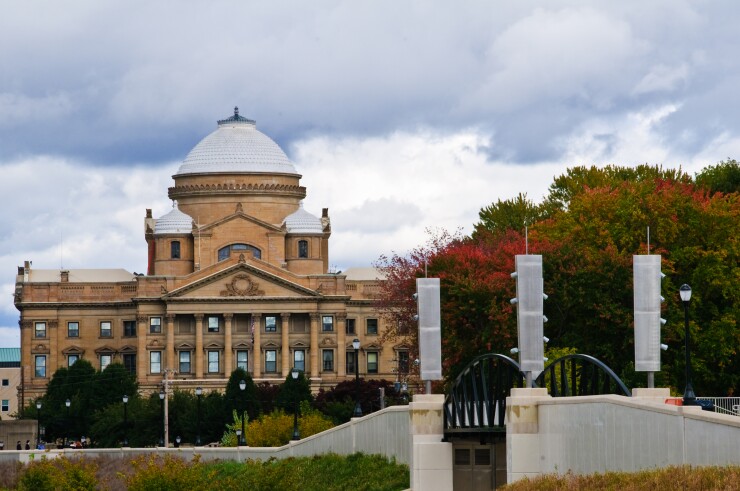Luzerne County, Pa.’s debt refinancing package turned out much better than planned and will reduce overall debt by $4 million, even after absorbing $7.9 million in new borrowing to fund an energy savings project, officials announced Thursday.
Before the refinancing, the county owed $316.39 million in principal and interest through 2029, according to a chart released Thursday.
The county’s outside financial adviser initially had estimated the refinancing would land at interest rates around 4 percent and bring the total debt owed to $319.9 million, with the energy project included.

Instead, the county secured an average interest rate of 2.79 percent for the new package, reducing the total debt owed to $312.11 million, officials said during an announcement outside the courthouse on River Street in Wilkes-Barre.
The 2029 payoff date was not extended, and all outstanding variable rate debt was converted to fixed rates, officials said.
The package also reconfigured debt repayments, resulting in $12.2 million less owed from 2017 through 2019.
As a result, the county will have an additional $5.7 million available this year and owe $5.3 million less for debt repayments in 2018.
While stressing she has only one vote, Council Chairwoman Linda McClosky Houck said she would support applying some of these funds to eliminate the administration’s proposed 2 percent tax hike in 2018.
Council Vice Chairman Tim McGinley said he wants to review all options before making such a pledge because the revenue is a one-time windfall arriving amid other looming obligations.
The county would have to come up with approximately $8.05 million to get caught up on employee pension fund subsidies, which have been paid in the year after they are due for several years, causing the fund to miss out on investment earnings.
The windfall also could clear the county’s running operating deficit, which was tallied at $8 million at the end of 2016, allowing the county to start building a reserve fund.
The county also will be on the hook for an estimated $19.26 million emergency 911 radio communications system overhaul. A consultant has said the switch from an analog to digital system is crucial because the radio transmitters and receivers that allow emergency responders to exchange messages will become obsolete in 2020. Officials have said it’s highly unlikely any state funding will help pay for the upgrade.
In addition to the $5.7 million from debt savings available this year, the county has amassed another $5.9 million in the bank from these one-time receipts, according to county Manager C. David Pedri:
- $550,000 in additional, unbudgeted state revenue for domestic relations.
- $811,000 from council’s prepayment of Children and Youth expenses last year.
- $4 million in proceeds from settling baseball franchise litigation with Lackawanna County.
- $540,029 set aside in this year’s budget as a reserve that Pedri said the administration won’t touch.
The county’s financial consultant will brief council members Nov. 14 on its recommendations for allocating the windfall, Pedri said.
He praised council members past and present for getting a handle on finances since the county switched to a customized home rule government structure in January 2012, when the county faced more than $450 million in debt.
“We’re still $312 million in debt, so there are still tough decisions to be made, but the tough decisions that were made throughout this entire form of government got us here today,” Pedri said.
McClosky Houck — who, like McGinley, was among the initial council members seated in 2012 — said it was a “daunting task” keeping services operating while building a new government, tackling debt and ending poor past practices.
She credited both Pedri and prior county manager Robert Lawton and council colleagues who have “taken some heat” for the “bright new horizon.”
LCCC also benefits
Luzerne County Community College also will save $1.6 million through the refinancing because it is responsible for additional debt linked to the package, officials said.
College President Tom Leary said the money will be invested in capital projects to benefit students. Many facilities at the college, which he said is the largest in Northeastern Pennsylvania, were designed in 1974.
College administrators will review a list of as many as 40 projects to prioritize which will be funded.
“It’s a great opportunity. I commend the officials and county council for their work on this project,” said Leary.
McClosky Houck said a tax reduction is not prudent because tax revenue must remain stable to cover debt repayments that will return to original amounts in future years.
Without the new package, the county would have paid around $26 million annually through 2028, wrapping up with a final payment of $3.9 million in 2029.
With the new structure, the county will pay $20.3 million this year, $20.7 million in 2018 and $24.86 million in 2019. The remaining payments will be around $26 million, while the final 2029 payment will increase to $11.1 million.





